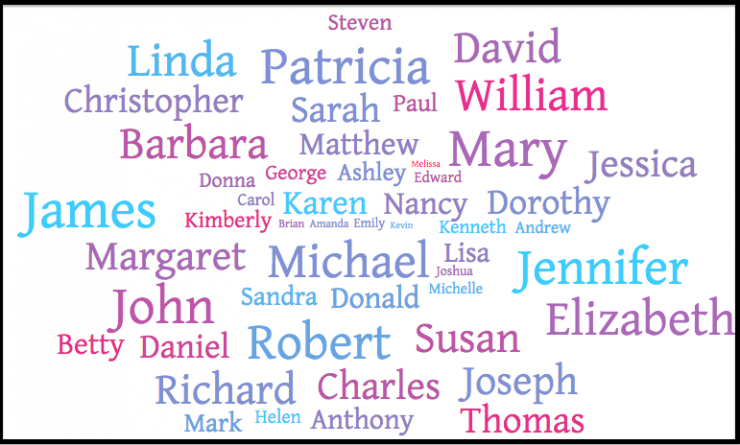Submitting Like A Man
What's In A Name, Anyway?
This is the fourth installment of the blog series Submitting Like A Man (SLAM), created by writer Mya Kagan. The project examines what happens when Mya resubmits scripts to previously rejected opportunities, this time using a man’s name. For more on SLAM, check out submittinglikeaman.com or follow @theSLAMblog or @Mya_Mya.
In May 2010, when Elena Kagan was nominated to the Supreme Court, it became clear to me that names really matter. Justice Kagan and I are not, to my knowledge, related. But with her name plastered all over the media, I quickly found out how advantageous it can be to have a “famous” name. I was moving at the time, and as every New Yorker knows, there is nothing more treacherous and dog-eat-dog than apartment hunting...unless your surname is trending on Twitter. For a short, bizarre window, I got excited return calls from landlords who wanted to rent to me thinking they’d get bragging rights that the newest Supreme Court Justice’s cousin lives in 2A.
Women forming a movement and changing names together sounds really empowering. I see it as a brilliant coup to the discriminators, some sort of modern-day Lysistrata that swaps out withholding sex from men for withholding identity from the industry, where the women come together and take a stand.
Once the frenzy of Justice Kagan’s appointment died down, life as a Kagan went back to normal. But in the years since, I have often reflected back on that experience and wondered if I would find continued benefits to my [coincidental] last name if I were a lawyer or aspiring judge. Or, perhaps better yet, what would it be like if I shared a last name with someone who was famous in my field? For example, what if I happened to have the name Mya Kushner? What about Mya Pinter or Mya Vogel? If you were reading play submissions, and you came across one with the name Mya Albee, you have to admit it would at least catch your attention, and it may consciously or otherwise influence your feelings about the script just a little bit.
What I’m saying is: names matter. I'm not saying that's my preference, but as much as we can try to avoid bias, there are countless studies documenting that it often happens anyway. Take, for example, the well-known study "Are Emily and Greg More Employable than Lakisha and Jamal?", in which companies in Boston and Chicago were found to treat job applicants with common African American names differently than applicants with common white names. In the study, even the Equal Opportunity Employers—companies who were making a concerted effort to hire minorities—demonstrated a bias against resumes with the names Lakisha Washington and Jamal Jones.

In the field of writing, there are countless examples of pen names chosen for these very sorts of reasons; I am by no means the inventor of the concept of “submitting like a man.” George Eliot (aka Mary Ann Evans) is an example that comes to mind immediately. J.K. Rowling famously uses initials, evidently so boys would not be deterred from reading her books. And the list goes on: P.L. Travers (Pamela Lyndon Travers), George Sand (Amantine-Lucile-Aurore Dupin), E.L. James (Erika Leonard). In a way, writers are lucky because in other fields, the choice to take on a different identity is more involved. For example, Dr. James Barry, a British medical school graduate who was as a distinguished physician in South Africa in the early 1800’s, was found after his death to have been a woman, Margaret Ann Bulkley, who had been living in disguise for over forty years.
I have been asked by a lot of people if I am going to submit my new work as Max or return to using my real name, and I feel torn about it. I am very proud of and attached to my name. But the reality is we have a long way to go until we truly stop judging a book by its cover, or perhaps I should say, an author by her name.
Sometimes I think about the idea that all women writers could take on ambiguous or male names, and we could be done with this discrimination once and for all. But a big part of me hates this idea. Women shouldn’t be the ones who have to change—the people with bias should be the ones to change. For women to change names feels like a concession or a workaround; it doesn’t treat the problem at its root, and it feels wrong on principle. Yes, many groups seeking assimilation have historically turned to names as a way of achieving integration. But why should we have to deny our identities or heritage? It feels like a slippery slope to the end of diversity, where everyone is named off a repetitive list of five bland monikers.
Yet at the same time, women forming a movement and changing names together sounds really empowering. I see it as a brilliant coup to the discriminators, some sort of modern-day Lysistrata that swaps out withholding sex from men for withholding identity from the industry, where the women come together and take a stand. Huzzah!
Ultimately, a change of my own name is what I'm currently planning to do. Not a full-on male name, but initials or a gender-ambiguous pen name. I am tired and frustrated and ready to be treated equally now, and even if it’s a shortcut, I might not be here by the time things finally change.
Also, just because I pick the workaround and use a different name doesn’t mean I can’t simultaneously work to treat the problem at its root. Maybe some day men will want to “submit like a woman” so they can be taken more seriously, and we'll have Buzzfeed lists for “Ten Male Writers Who Got Published by Using Female Names.” Fear not, I'd never actually propose to counter discrimination of one group with discrimination of another. What I really want to see is a list called “Ten Writers Who Got Published Without Having to Change Their Name to Disguise Gender or Demographics.” It would make terrible clickbait, but it would make me so happy.
Hey, a girl can dream.










Comments
The article is just the start of the conversation—we want to know what you think about this subject, too! HowlRound is a space for knowledge-sharing, and we welcome spirited, thoughtful, and on-topic dialogue. Find our full comments policy here
It is ridiculous it is still a popular practice for female writers to change their pen name
to hide their gender and identity. It’s as if male publishes or consumers will
contract ‘cooties’ through the pages. J.K. Rowling was suggested to change her
name from her publishers so it would not discourage boys from reading but
writes from the perspective of a boy. Isn’t the content of the story female
writers publish more important to consumers than her gender? Rowling has
created a world so loved that it has turned into a movies, theme parks and all
her books are under the 25 most sold novels of all time. Women should be
allowed to keep their identity without the fear of losing consumers; the
publishers are at more faults for having so little faith in book readers.